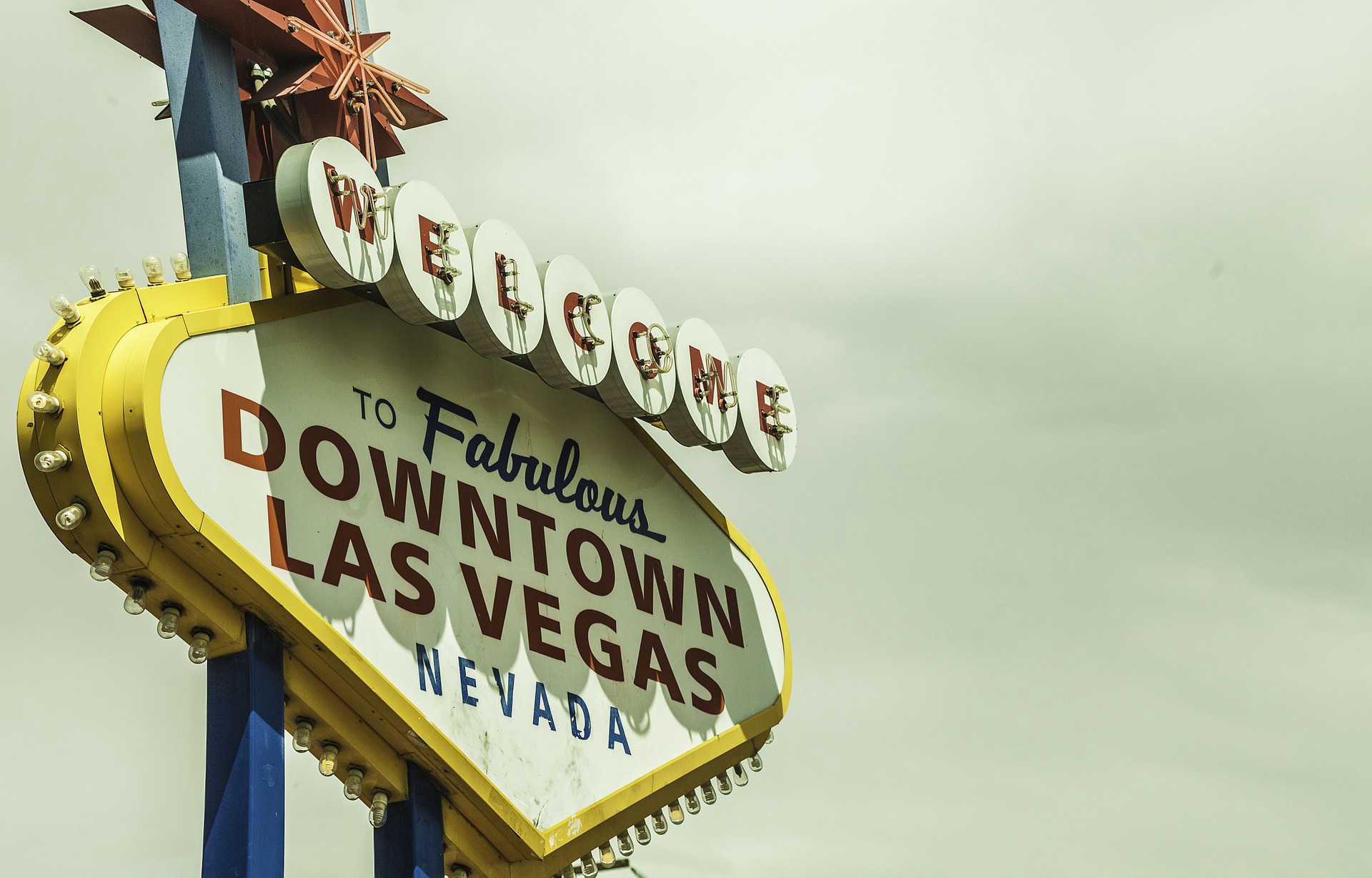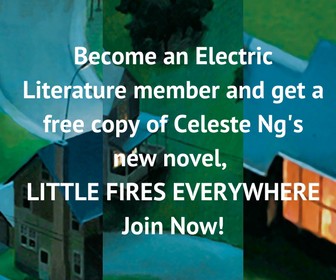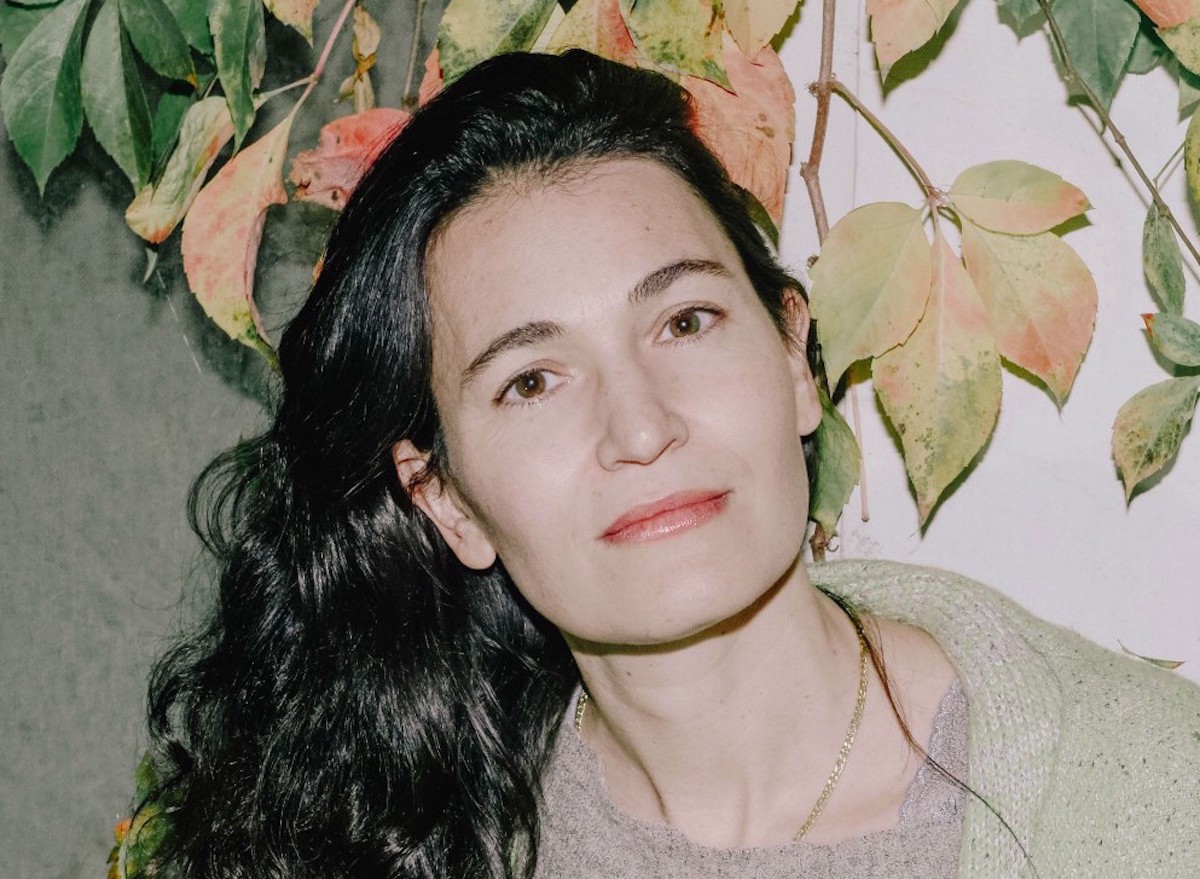Craft
Art Is a City in the Desert
Writing in, and about, Las Vegas

Calvin Gimpelvich was awarded the CODEX/Writer’s Block Residency through Electric Literature and Plympton. The residency was available to authors who had published an original story in Recommended Reading, Electric Literature’s weekly fiction series, in 2016 or 2017. Read his winning story, “You Wouldn’t Have Known About Me,” here.
I spent a month at a residency in Las Vegas at the hottest time of the year — up to a hundred and sixteen degrees in late day. Trash cans melted and the heat functioned as a sort of inverted blizzard, trapping indoors. I spent most of my time sweating in the studio in mesh shorts and bare skin, pacing or reading or typing. I tried not to use the air conditioner, because it was loud, and because I can’t shake the planetary guilt of energy inefficiency. The most shocking part of Las Vegas, to me, amidst the drinking, gambling, prostituting, weed-smoking, neon, tourist-packed spectacle zones — the only excess that gets me — is the number of businesses that keep their doors open. They’re climate controlled, pumping cold air to the open desert. Some places, mostly restaurants and bars, spray a cool mist on their patrons outdoors. The only place I visited without air conditioning was a musician’s workshop in an old auto garage. He worked nights and kept his laptop on a fan to avoid overheating. When that didn’t work, he stuck it into a miniature fridge.

While I was at the residency, my girlfriend was home applying gold leaf to hundreds of skeletal leaves gathered from neighboring parks. She spent two months doing this, working full time, coming home, and gilding the leaves — which involves finding them, applying sizing, applying the gold or fake gold, and brushing the excess away. We live in Seattle and the sky is a uniform grey — which wouldn’t be strange, except it’s the middle of summer. Smoke mimics the usual fog; Canadian forests are burning to bad you can see it from space. The mountains and trees are indistinct shapes, giving a dreaminess to the present, heightened by fighter jets overhead, demonstrating our military strength in an airshow. Formations appear in the haze, it sounds like the sky is ripping apart, and the sun is a pulsing bloody orange. My girlfriend paints the gallery black, to better contrast with her leaves.
This piece is a fairytale task — and it’s not her first one. She constructed and wore a wolf pelt from moss, she sewed (stitched?) a blanket of leaves. I can see these labors condensed to one line in a story: “She gilded a thousand dry leaves.”
The reality isn’t so fine. She’s exhausted, her house is a mess, she spent all her savings on gold — and fake gold, when she couldn’t afford the real leaf. Accumulative tasks require endurance, and there’s tension around the sustainability of working two jobs — one for money, one is the art — and ideally, when the viewer walks in, all this plodding reality consolidates to a beautiful relevant thing. The labor remains, but seen through an elegant lens. It’s quiet. The chaos from which it emerged, the all-nighters and stress, hides in the final product.


I wanted to write about how Las Vegas was founded by Mormons and how that fits into Western expansion, ideas and ideals built into the United States. I thought about John Winthrop and his “city upon a hill,” about the religious and utopian communities formed. I wanted to write about the myriad people who came to Vegas in search of a dream — Mormon settlements, the laborers who came to build dams, the Air Force, the mafia starting casinos, the gamblers who hoped to get rich, as well as the showgirls and other performers. I thought about the recent effort, because the recession hit entertainment (and Vegas) so hard, to diversify their economy — which led to a tech company moving in and making headquarters in the old city hall. Vegas seemed uniquely open to people’s imaginings of it, and I wanted to build a piece around the virtues and dangers of this acceptance: how Vegas welcomed immigrants and hosted the United States’ first refugee writers program, and how other imaginings — like that of being a segregated society, the “Mississippi of the West” — were not so benign. I found it interesting how the dreams in Vegas stacked up, both how much and how little the groups interact. Everything seemed to connect — from the history of the Paiute tribe, displaced by Mormon missionaries, who have 25 acres of land, a sovereign nation, within city limits, to Nevada’s high suicide rate, buffered by access to guns, by the deaths in glitzy hotels.
That essay didn’t work out.
Sometimes every word is pushing a boulder uphill. When I stop to read what I’ve done, the rock comes tumbling down.

It’s particularly frustrating, because I got so much done in my studio there. Working most every day, eight hours a day, I revised seven chapters. This productivity erases the loneliness and difficulty of being away, takes whole difficult days and shrinks them to trifling moments. I’m already seeing the residency as a montage. Here is me working, here is me pacing, there I get bored, I get stuck, but then production returns. Reality folds into a memory, just as the notes and old drafts fold into the work that I make. When I finish a piece, I forget the work that went in — and if I, as the writer, forget, why should an audience care?

Vegas is interesting because the spectacle requires such a density of artists, artisans, and performers. A casino-hotel that changes displays must have sculptors, florists, designers, and more, depending on final product. Glass blowers make and replace neon signs; video ads need actors, models, photographers, film crews, editing teams; casinos don’t sprout those strange patterned carpets themselves, they need some graphic design.
A show, dependent on subject, needs actors, acrobats, musicians, singers, dancers, MCs, magicians, comedians, a stage manager, lighting and soundboard technicians, and a city billing itself as “The Entertainment Capital of the World” has to come through — meaning jobs for a lot of performers. This is a place where people who never hit big, or who flared once and out, can live off their gigs. Where a musician who released a single hit — in 1973 — headlines a regular twice-a-week show. I hear complaints that fine arts, less commercial arts, aren’t particularly supported — which I believe — but there’s something wonderful about going to a variety show drawn from a community of middle aged performers (none of whose names I know) displaying the comfort and skill of decades inside of their trades.
Jobs for artists swells that population and the city must cater to them. Grocery stores accommodate unusual hours — a couple I know, a baker and chef, moved partially because Vegas obliges their schedules. Performers form voting blocs whose needs are brought to the City Council. Doctors and dentists and lawyers serve them. They need housing, glitter, costumes, chiropractors, accordion tuners, child care, water, and transportation. A starlet runs errands in comfortable shoes. The concentration of artistic jobs makes it easier to recognize the mundanity from which entertainment is formed.

When I was younger, I had a romantic idea — the montage idea — of what being an artist entailed. In this vision, the final product — say, the gallery filled with gold leaves — expanded backwards, touching all aspects of life, imbuing them with meaningful golden drama. Collecting and gilding those leaves would have the serenity of a fairy tale sentence. Writing a book would have difficulties; stormy romantic difficulties, that had nothing to do with back pain or remembering that I’d forgotten to get more peanut butter to make another last-minute sandwich. I thought it would make life glamorous — in a different way, though in the same vein, as the tourists who come to Vegas for an aspect of celebrity life; the costumes, parties, and catered-to whims seen in rock star biopics.

I’ve only had minor celebrity contact, but I’m convinced that this vision is a marketing ploy. It doesn’t matter how rich or famous you are — regular life will creep in. Even movie stars get cavities, they too must endure the dentist.
For a minute I did grunt work on reality television. Nothing destroys the illusion so much as poking behind the scenes (or, in my case, hauling endless set dressing). Television flattens to an image of itself, lacking depth, and yet the reality collapses so easily into a dream.
I’m more interested in myself as a person than as a monodimensional writer, and I’m more interested in Las Vegas as a place people live than a symbol of pleasure and excess. I saw the concrete effects to others’ imaginations — creation set into the world.

The bookstore hosting the residency is split in two parts and run by a couple. The front stocks merchandise — books, objects related to books — and the back functions as a flexible workshop/classroom/performance/community space. The back, Codex, invites children to write and print their own books, using the bookstore’s professional printer. Classes for minors are free, happening independently and as field trips tied into the schools. Nevada’s public schools rank behind most of the country — switching between last and second-to-last when ranked against 49 other states. The bookstore entices children to literacy through its workshops, pet rabbit (“the boss”), and an artificial bird sanctuary — hundreds of stuffed birds hung from the ceiling, with stories and names.
Adults get book clubs, writing groups, and sundry events. I’m invited to read in a flash reading: five authors with five minutes each; the shortest and most variant reading that I have seen. There is a woman reading an excerpt of vampire noir/romance with such intensively smoldering eyes, she could easily be a character in her own piece. There is a poet who works for the bookstore, a poet who does not, an Afrofuturist essay, and me. I meet a local author, who runs a young publishing company with her husband, and who I see read at a casino bordering town.
Certain casinos — not the big ones — double as community centers. Childcare, bowling, movie theaters, restaurants, and games. I get lost trying to find the right room, but do, with enough time to use the bathroom before the reading begins. The vampirist and essayist are both there, as are a handful of local writers who schlep to each others’ events. This is part of being a writer, if not writing, finding a community to support, who will support you in turn, people whose feedback you trust, drafting and trading critiques.
It’s the writing and publishing couple who show me around, drive me to the historically black West Side, to the suburbs of Summerlin and Henderson, to affluent mountain towns, and Chinatown, and the jail, and, finally, to that open mic cabaret where career musicians and singers perform.

There was an evening I looked out the studio window and wondered why I’d never noticed that the glass was tinted before. But it wasn’t the glass that was tinted; it was the sky. I opened the window and stepped through the gap and felt the heat hit, into a world of pink and orange. Light flooded the courtyard, making the desert, with its everywhere sky and the rocky naked mountains, seem beautifully, unnaturally present. For ten minutes this stayed, and then the sun set, and the wind blew diffuse trash past the door. Somewhere it rained, and the dry air carried that smell. Lit signs popped on the darkening sky as I walked past the bookshop and to the grocery store, more than a mile away, breathing the dusty dry air, feeling sweat collect between my shirt and backpack, continuing in the repetitive tasks around which everything forms.








